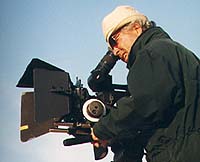Cinema of Tunisia
| Cinema of Tunisia | |
|---|---|
 Naceur Ktari (2000) | |
| No. of screens | 48 (As of July 2022)[1] |
| • Per capita | 0.2 per 100,000 (2009)[1] |
| Produced feature films (2005–2009)[2] | |
| Total | 4 (average) |
| Number of admissions (2008)[3] | |
| Total | 600,000 |
The cinema of Tunisia began in 1896, when the Lumière brothers began showing animated films in the streets of Tunis.
History
The first feature-length movie produced in North Africa, Les Cinq gentlemen maudits (The Five Accursed Gentlemen), was filmed in Tunisia by French director
In 1927, Tunis-Film, the first Tunisian film distribution company was established. After the country's independence, movies were exclusively produced by
Domestic productions were rare: the few movies which were produced since 1967 tried to reflect the new social dynamics, development, identity research, and modernity shock.
The first Tunisian actress was
In 2007, several films were produced and grabbed public attention, such as Making Of, directed by Nouri Bouzid and Nejib Belkadi's VHS Kahloucha.
In 2013,
On March 21, 2018, the country opened its first City of Culture, a project one of its kind in Africa and the Arab world , located in downtown Tunis. The complex contains several theaters, cinemas, screens, art and history galleries, exhibition halls, a contemporary and modern art museum, a national book centre and a cultural investment centre.[11]
The first ever
Around 2015, there were less than 30 screens under commercial use all across Tunisia, a number that is widely considered low in international standards for a country with a population of 11 millions. In November 2019, the number was estimated at 41 screens all across Tunisia. The country has seen a significant increase in theaters in recent years thanks to a renewed interest in movie-going as well as the development of multiplexes, a newly-introduced concept in the country. As of July 2022, there are 48 screens all across Tunisia.
Academy Award nominations
Tunisia has submitted films for the

See also
- Arab cinema
- Egyptian cinema
- Cinema of the world
References
- ^ a b "Table 8: Cinema Infrastructure – Capacity". UNESCO Institute for Statistics. Archived from the original on December 24, 2018. Retrieved November 5, 2013.
- ^ "Average national film production". UNESCO Institute for Statistics. Archived from the original on October 23, 2013. Retrieved November 5, 2013.
- ^ "Table 11: Exhibition – Admissions & Gross Box Office (GBO)". UNESCO Institute for Statistics. Archived from the original on December 24, 2018. Retrieved November 5, 2013.
- ISBN 978-0-253-05205-6. Archivedfrom the original on January 18, 2023. Retrieved January 3, 2023.
- ^ "History of Tunisian Cinema". Archived from the original on October 28, 2008.
- ^ "Archived copy". Archived from the original on January 25, 2024. Retrieved November 18, 2022.
{{cite web}}: CS1 maint: archived copy as title (link) - ^ "Africiné - le leader mondial du cinéma africain et diaspora". Africiné. Archived from the original on March 9, 2021. Retrieved March 15, 2021.
- ^ "Carthage Film Festival Page on IMDB". IMDb. Archived from the original on December 27, 2009. Retrieved June 29, 2018.
- ^ "Un cinéma dynamique (Tangka Guide)". Archived from the original on October 7, 2011.
- ^ Chikhaoui, Tahar (May 1994). "Selma, Nejia, Moufida and the others". Ecrans d'Afrique (8): 10. Archived from the original on September 8, 2014. Retrieved February 10, 2013.
- ^ "TUNISIA INAUGURATES CITY OF CULTURE". Tunis Daily News. Archived from the original on March 26, 2018. Retrieved March 26, 2018.
- ^ "Special Rules for the Best Foreign Language Film Award". Academy of Motion Picture Arts and Sciences. Archived from the original on July 5, 2018. Retrieved January 21, 2018.
- ^ [Azurcity.tn,520,73539,3 "Azur City Tunis"]. Azur City.
{{cite web}}: Check|url=value (help) - ^ "La Cigale Gammarth". Tunisie.Co. Archived from the original on May 13, 2018. Retrieved May 12, 2018.
- ^ "Special Rules for the Best Foreign Language Film Award". Academy of Motion Picture Arts and Sciences. Archived from the original on August 20, 2008. Retrieved September 6, 2009.
- ^ "Romania Earns First Oscar Nomination for 'Collective,' Tunisia for 'The Man Who Sold His Skin'". www.hollywoodreporter.com. March 15, 2021. Archived from the original on March 15, 2021. Retrieved March 15, 2021.
- ^ Bergeson, Samantha (December 21, 2023). "2024 Oscar Shortlists Unveiled: 'Barbie,' 'Poor Things,' 'Maestro,' and 'The Zone of Interest' Make the Cut". IndieWire. Archived from the original on December 22, 2023. Retrieved December 22, 2023.
- ^ Mullally, William (January 23, 2024). "Kaouther Ben Hania makes history as first Arab woman with two Oscar nominations". The National. Archived from the original on January 24, 2024. Retrieved January 25, 2024.
Further reading
- Robert Lang, New Tunisian Cinema: Allegories of Resistance, Columbia University Press, 2014, ISBN 978-0-231-16507-5
- Florence Martin, "Cinema and State in Tunisia" in: Josef Gugler (ed.) Film in the Middle East and North Africa: Creative Dissidence, University of Texas Press and American University in Cairo Press, 2011, ISBN 978-9-774-16424-8, pp 271–283

